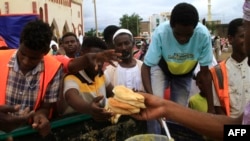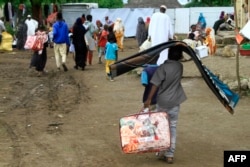U.S.-brokered peace talks on Sudan have failed to end the country's 16-month conflict but have succeeded in gaining greater humanitarian access to millions of people who have been deprived of food, medicine and other essential relief for many months, according to a senior U.S. official.
In wrapping up a first round of peace negotiations Friday in Geneva, Tom Perriello, U.S. special envoy for Sudan, told journalists "it is extremely important that we have found breakthroughs on humanitarian access for millions and millions of people in Sudan.
"But this is just the beginning," he said. "We need to see the results from the parties, whether that is on protection of civilians or humanitarian access and we need to continue to build where we can."
Search for humanitarian corridors
Over the past two weeks, representatives from the United States, Switzerland, Saudi Arabia, the United Nations, African Union, Egypt, and the United Arab Emirates have focused on reopening three humanitarian corridors — the Western border crossing in Darfur at Adre, the northern Dabar Road from Port Sudan, and the southern access route through Sennar.
Perriello said the three routes combined "would open up food, medicine and lifesaving services for 20 million people in Sudan," adding that negotiators got commitments from the two warring parties, the paramilitary Rapid Support Forces (RSF) and Sudanese Armed Forces (SAF) to send aid through both the Adre and Dabar routes.
"We are in active negotiations with the parties on multiple potential routes for Sennar, which would open up another 11 million with access," he said.
Jens Laerke, spokesperson for the Office for the Coordination of Humanitarian Affairs, told journalists that United Nations and humanitarian partners continue to engage with the Sudanese authorities to ensure the sustained and scaled-up delivery of supplies into Sudan.
"This is crucial to meet people's most urgent needs at the height of the rainy and lean seasons in Darfur," he said, adding that the 15 trucks that crossed into Sudan from Chad via the Adre crossing this week "were a step in the right direction."
"But the fighting and deepening hunger crisis in Sudan means there has to be a steady flow of food, nutrition, water, sanitation, hygiene and medical supplies for people at risk of famine in more than a dozen areas," he said.
Hundreds of thousands on brink of famine
The World Food Program reports more than half of Sudan's population, some 25.6 million people, face acute hunger, including more than 755,000 people on the brink of famine.
The RSF sent a delegation to the talks. However, Sudan's military has stayed away because of the participation of the United Arab Emirates, which it accuses of supporting the RSF and of fueling war by sending arms to the paramilitary group.
While not responding to these accusations, Lana Nusseibeh, head of the UAE delegation, said that the position of her country has been clear.
"We see the future of Sudan as one that requires a peaceful civilian transition of power. We are dedicated and committed to engage in these talks and use all our efforts to bring about the cease-fire that the Sudanese people so desperately need and so desperately deserve," she said.
While acknowledging the difficulties of negotiating a cease-fire with only one of the warring parties present, U.S. mediator Perriello said it has been possible to make progress in other areas because "we were able to engage with the SAF many, many times a day virtually by phone."
The Geneva talks also have focused on implementing the Jeddah declaration, which calls for the protection of civilians and respect for international humanitarian law even in wartime. Both warring parties signed the agreement on May 11, 2023, but a week later they breached a subsequent agreement which called for a seven-day cease-fire.
Underscoring the importance of complying with the Jeddah declaration, Perriello said, "We have all seen the horrific atrocities of rape, sexual slavery, starvation used as a weapon of war, shelling, bombing and daily terrors that are realities of the Sudanese people."
He said the delegations have been working hard to achieve a compliance mechanism that can work for the existing Jeddah declaration and have presented that to the parties for consideration.
In the meantime, he said, "We got agreement from the Rapid Support Forces for a code of conduct that will be issued to their soldiers.
"It will have many of the basics of international humanitarian law, including protections of women and protections related to farming and the harvest so we can look at the issues not only of the current famine, but how we begin to help the Sudanese grow out of this."
The U.S. envoy said no formal date has been set for the next round of peace talks because "the urgency of this crisis is one in which we do not want to [be] constrained by the formal dates of when we can get on airplanes."
"We know that there are decisions today that are going to be the difference between whether we start to see hundreds of trucks go across Adre or whether the brakes are thrown on. That is a today thing and that is a tomorrow thing," he said. "We are very committed to seeing this as a 24/7 operation in the face of a famine that the world has largely ignored."

